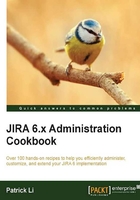
Anonymizing JIRA exports
Sometimes, in order to troubleshoot your JIRA instance, you need to provide a data dump for Atlassian or another service vendor so that they can recreate your environment to reproduce the problem locally. If you have sensitive information in your JIRA, this can be troublesome. In this recipe, we will look at how we can anonymize our data in JIRA.
Getting ready
For this recipe, we need to use the JIRA Anonymizer utility. You can download it from the following link:
To run the Anonymizer utility, make sure that the following prerequisites are met on the machine you are running the utility from:
- Make sure the
JAVA_HOMEenvironment variable is set properly - Running the
java -versioncommand will display the correct version of Java
How to do it…
Perform the following steps to anonymize your JIRA export:
- Unzip the
jira_anon.zipfile to a temporary directory. - Copy your JIRA XML export (
entities.xml) to the temporary directory. - Open up a command prompt and go to the temporary directory where the
joost.jarfile resides. - Run the anonymizer application with the
java -Xmx512m -jar joost.jar entities.xml anon.stx > anon-entities.xmlcommand, whereentities.xmlis the name of the original XML export andanon-entities.xmlis the new anonymized XML file to be created.Note
JIRA's XML backup utility produces a ZIP file that contains two XML files; do not anonymize
activeobjects.xml.
How it works…
The JIRA Anonymizer protects sensitive information in your JIRA by going through your JIRA XML export and replacing values from many fields in JIRA with a string of the character x. The list of fields that are to be anonymized include the following:
- Issue summary, environment, and description
- Comments, work logs, and change logs
- The project description
- Configuration scheme description such as the notification and permission schemes
- Attachment filenames
- Text custom field types
Depending on the size of the export, the utility may require additional memory for processing. The -Xmx parameter indicates the amount of memory to allocate, so in the preceding steps, we allocated 512 MB of memory to run the utility.